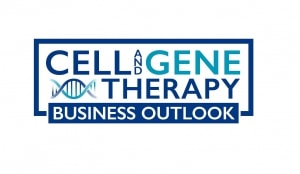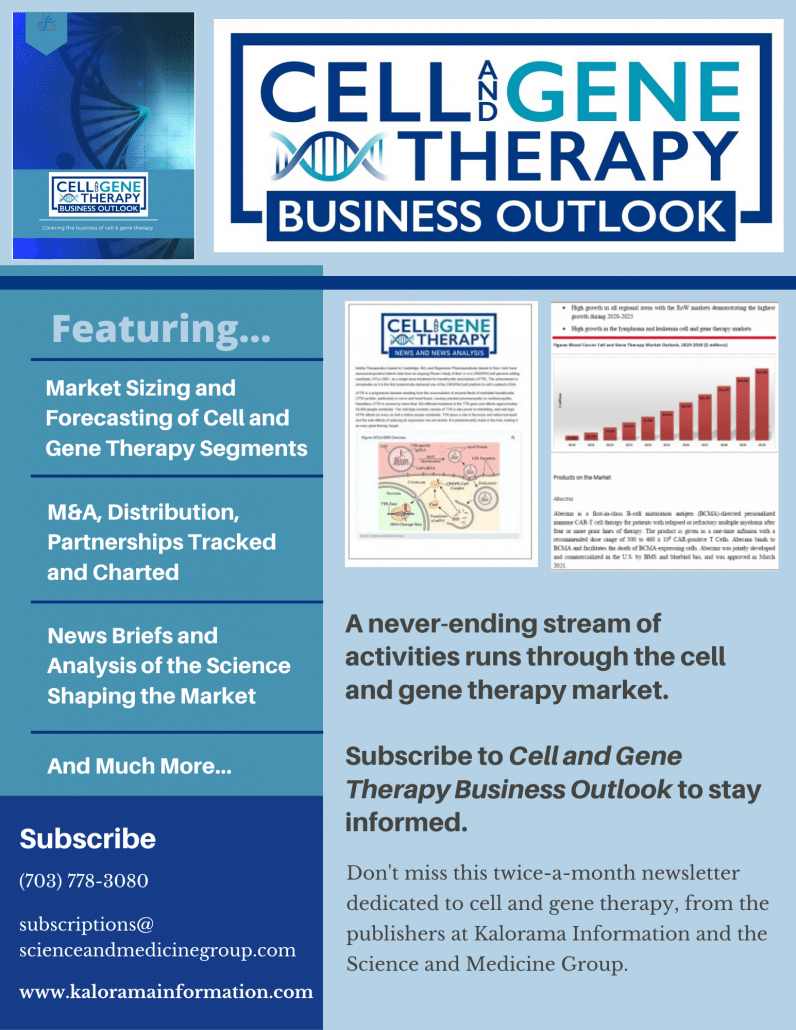
There have been a number of recent developments in cell and gene therapy, as detailed in our bimonthly newsletter, Cell and Gene Therapy Business Outlook.
- Vertex Pharmaceuticals, based in Boston, MA, has announced plans for a 344,000 square-foot R&D and manufacturing facility in the Boston area. Details of the new facility were announced at the dedication of the Jeffrey Leiden Center for Cell and Genetic Therapies, where Vertex will accommodate 400 employees working on therapies for sickle cell disease, beta thalassemia, type 1 diabetes, and Duchenne muscular dystrophy. The new facility will be called Leiden II and will make room for 500 additional employees. Vertex plans to complete the new facility in 2025, bringing the company’s total footprint to 1.9 million square feet across five sites in Boston area. Among the cell and gene assets Vertex is developing are CTX001, an autologous CRISPR/Cas9 gene-edited hematopoietic stem cell (HSC) therapy for the treatment of β-thalassemia and sickle cell disease, currently in Phase III clinical development, and VX-880 (formerly known as STx-02), an allogeneic human stem cell-derived islet cell therapy for the treatment of type 1 diabetes patients with impaired hypoglycemic awareness and severe hypoglycemia.
- Sernova Corp, a clinical-stage regenerative medicine company based in London, Ontario, and Evotec, a developer of induced pluripotent stem cell (iPSC) cell technologies based in Hamburg, Germany, have announced a partnership to develop an implantable (iPSC)-based beta cell replacement therapy for the treatment of type 1 and type 2 insulin-dependent diabetes. Evotec produces islet-like clusters of human iPSC-derived beta cells in a proprietary, scalable bioreactor process, and these cells have demonstrated the ability to normalize blood glucose with functional equivalence to primary human islets using in vivo models of type 1 diabetes. Sernova’s Cell Pouch System provides a highly vascularized, organ-like environment for the implanted therapeutic cells, has demonstrated efficacy in isograft, autograft, and allograft animal transplantation models of diabetes, and is currently being evaluated in Phase I/II human clinical trials for the treatment of type 1 diabetes using human donor islets.
- AffyXell Therapeutics, a cell and gene therapy company based in Seoul, South Korea has expanded its partnership with GenScript ProBio, a biopharmaceutical contract development and manufacturing organization (CDMO) based in Piscataway, NJ. The agreement covers the development and production of viral vectors required for AffyXell’s second pipeline of genetically modified mesenchymal stem cell (MSC)-based therapeutics, and follows a similar agreement in December of 2021 covering AffyXell’s first pipeline. AffyXell is joint venture established in January 2020 by UK-based Avacta Group and South Korea-based Daewoong Pharmaceutical to engineer Daewoong’s allogeneic MSCs to produce Avacta’s Affimer proteins, which are small, single domain binding proteins designed to enhance immune-modulatory effects. The company’s initial focus will be on treating inflammatory and autoimmune diseases., with potential oncology targets down the road.
- DiNAQOR, a biotech company developing gene therapies for cardiomyopathies and heart failure based in Schlieren-Zürich, Switzerland, has announced the launch of DiNAQOR DiNAMIQS, its biomanufacturing subsidiary. Based in the company’s 1,200 square-meter (13,000 square-foot) manufacturing facility in Bio-Technopark Schlieren-Zürich, the DiNAMIQS platform provides high-quality recombinant adeno-associated viral (AAV) vector manufacturing for both in vitro and in vivo preclinical applications at a scale of up to 50L. For clinical applications, DiNAMIQS is currently building a GMP-compliant 2,400 square-meter (26,000 square-foot) facility that can produce viral vectors at a scale of up to 500L.
- Aldevron, a manufacturer of plasmid DNA, RNA, and proteins based in Fargo, ND, and Inscripta, a biotech company specializing in genome engineering based in Boulder, CO, have reached an agreement providing Aldevron a license to manufacture and commercialize Eureca‑V Nuclease, (aka wild-type MAD7 nuclease), a Type V CRISPR nuclease isolated from the bacterium Eubacterium rectale found on Madagascar. MAD7 nuclease has a relatively small size and uses a single domain to create sequence-specific, double-stranded cuts with staggered ends in its target DNA. Type V nucleases also tend to have fewer off-target effects in comparison to Type II nucleases. Aldevron will offer Eureca‑V as both a standard research-grade and a GMP-grade product, with a planned launch date in the third quarter of Aldevron also offers SpyFi Cas9 and wt SpCas9 CRISPR nucleases as research-grade and GMP-grade products, and AsCas12a (AsCpf1) and SaCas9 CRISPR nucleases as research-grade products.
- Researchers with Wilhelmina Children’s Hospital at University Medical Center Utrecht, the Netherlands, have published a study demonstrating the feasibility of using mesenchymal stromal cells (MSCs) to treat stroke damage in infants. The study was co-authored by Lisanne M Baak, MD, and Nienke Wagenaar, PhD, and published in the June 2022 issue of The Lancet Neurology. Ten infants diagnosed with perinatal arterial ischaemic stroke (PAIS) in the middle cerebral artery region were treated with a non-invasive, intranasally administered dose of bone marrow-derived allogeneic MSCs, and followed up with MRI at three months of age and motor assessments at 4 months of age. No serious adverse events were reported. A larger study will be required to assess therapeutic benefit, however MRI scans showed less injury than expected. In animal studies, intranasally administered MSCs have been observed to migrate to the area of damage within 24 hours of administration, where they secrete growth factors which promote natural repair mechanism, resulting in improved cognitive
- Danaher Corporation, based in Washington, D.C., has announced that it has joined the Bespoke Gene Therapy Consortium (BGTC). Launched in October 2021 as part of the Accelerating Medicines Partnership (AMP) program managed through the Foundation for the National Institutes of Health (FNIH), the BGTC’s goal is to overcome major obstacles to developing gene therapies for rare diseases in the areas of basic research, clinical research, manufacturing and production, and regulatory requirements. Danaher’s Life Science companies (including Pall Corporation, Aldevron, and Cytiva) are the latest to join the public–private partnership which includes the Food and Drug Administration (FDA), the National Institutes of Health (NIH), twelve pharmaceutical and biotech companies, and nine non-profits.
- Canada’s Stem Cell Network (SCN) has announced $19.5 million in funding for research projects and clinical trials, the largest funding boost in the organization’s history. The rise is due to increased funding from the Canadian Government, along with $22.4 million from 34 partner organizations, for a total of $42 million for research over the next three years. The 32 projects and clinical trials to funded by SCN will cover 20 different diseases in areas such as stroke, cardiovascular disease, type 1 diabetes, Parkinson’s, muscular dystrophy, blood cancers, multiple sclerosis, wound repair, and sepsis. Three teams have been granted Horizon awards, a new multi-year program valued at $3 million per award, for their work in the fields of treating blood cancers, advancing cardiac regeneration, and scaling up personalized therapies for type 1 diabetes.
- Bone Therapeutics, an orthopedic cell therapy company based in Gosselies, Belgium, has announced it has entered an exclusive three-month discussion period with Paris-based Medsenic, a privately-held biopharmaceutical start-up focusing on the therapeutic use of arsenic trioxide (As2O3) in the treatment of autoimmune diseases. The discussions will explore the benefits of a potential reverse merger where Bone Therapeutics would remain a Belgian listed, publicly-traded company and own 51% of Medsenic, while approximately 80% of the total outstanding share capital of Bone Therapeutics would be held by Medsenic’s shareholders. If the reverse merger is agreed upon, Bone says the combined company would hold a diverse therapeutic portfolio targeting a broad array of inflammatory and orthopedic indications.
- Cytiva (formerly GE Life Sciences), based in Marlborough, MA, has announced plans to open its new 7,400 square-meter (80,000 square-foot) GMP manufacturing facility in Grens, Switzerland on May 31st. The new site will manufacture single-use kits for Cytiva’s Sepax and Sefia cell processing systems, as well as consumables for its Xuri cell expansion bioreactor systems, quadrupling Cytiva’s manufacturing capacity for those products. The site will also include two ISO class 7 cleanrooms, an R&D facility with several engineering and bioprocessing laboratories, and a 100 square-meter (1,100 square-foot) BSL2 laboratory to serve as a process and application customer training center for Cytiva instruments, consumables, and software. The company says the new site will serve as a “Center of Excellence” for its cell and gene therapy business, a sector Cytiva says is central to its strategic growth plan. Cytiva already has cell and gene therapy manufacturing capabilities in Switzerland at a nearby facility in Eysins, which will continue operations through 2023 as production transfers to the new facility in Grens. The company also recently opened an 11,000 square-meter (120,000 square-foot) manufacturing facility in Cardiff, Wales.
- Avantor, a provider of life sciences products and services based in Radnor Township, PA, and Cytovance Biologics, a biologics contract development and manufacturing organization (CDMO) based in Oklahoma City, OK, have announced an agreement to manufacture research-grade and GMP-grade plasmids for biopharma customers. The companies say the agreement broadens Avantor’s ability to provide materials for next-generation vaccines, cell and gene therapies, and mRNA drugs, and expands Cytovance’s global commercial reach.
- Multiply Labs, based in San Francisco, CA, has announced that Thermo Fisher Scientific and Charles River Laboratories have joined its robotic cell therapy manufacturing Consortium, which has a mission to develop and validate an industrial scale, cGMP-compliant robotic manufacturing system for gene-modified cell therapies. Thermo Fisher will contribute its expertise in the automation of incubator technology, while Charles River will handle automation of quality control testing. UCSF and Cytiva had previously joined the Consortium, to oversee the cell manufacturing process and bioreactor technology automation, respectively. Multiply Labs will be responsible for the coordination of robotics development activities. The Consortium was created by Multiply Labs in 2021 to accelerate the scaling of cell therapies through the collaborative development of robotics technologies.
- Takeda Ireland, a Dublin-based subsidiary of Takeda Pharmaceutical Company, has announced the opening of a new cell therapy production facility at its Grange Castle site. In 2021, Takeda announced that it would invest €36.4 million (approximately $44 million) into expanding Grange Castle facility, which would create approximately 100 new jobs over the next three years. The facility will be used to produce Alofisel (darvadstrocel), an expanded human allogeneic adipose-derived mesenchymal stem cell therapy for the treatment of complex perianal fistulas associated with Crohn’s disease. Alofisel has been approved for use by the EMA in the European Union and the MHLW in Japan.
- Accarent Health, based in Cockeysville, Maryland, has reached an agreement with Stanford Health Care to cover CAR-T cell therapies for the treatment of cancers such as leukemia, lymphoma, and multiple myeloma. The agreement expands Accarent’s bundled rate offering of costly gene therapies through bundled episodes of care, and will provide access to Novartis’ Kymriah, Kite’s Yescarta and Tecartus, Juno’s Brenyanzi, and bluebird bio’s Abecma for the treatment of lymphocytic leukemia, B-cell lymphoma, large B-cell lymphoma, mantle cell lymphoma, and multiple myeloma.


